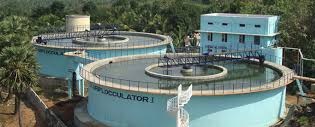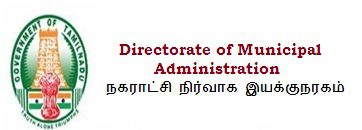
In order to keep up with the demands of rapid Urbanization the Government has decided, to implement Under Ground Sewerage Scheme in all the needy Urban Local Bodies, in a phased manner. The Detailed Project Report (DPR) for 117 ULBs have been prepared and implementation is taken up by Chennai Metropolitan Water Supply Sewerage Board (CMWSSB), Tamil Nadu Water Supply and Drainage Board (TWAD) and ULBs in 58 towns, with financial assistance from the National River Conservation Programme (NRCP), TNUDP III, JnNURM, UIDSSMT, Kfw, IUDM, TNSUDP, AMRUT, ADB and Smart City. The status of implementation of these works is given below:-
Sewerage Schemes under Implementation UGS schemes have been taken up for implementation in 22 Towns under the Tamil Nadu Urban Development Project-III at a total cost of Rs.1035.51 crore. Out of which, the UGSS in Udhagamandalam, Chinnamanur, Namakkal, Dharmapuri, Perambalur, Dindigul (part), Thiruvannamalai, Kancheepuram, Ramanathapuram, Tiruvarur, Cuddalore, Theni-Allinagaram, Vellore, Nagapattinam (part), Pudukottai, Tiruvallur, Virudhunagar, Krishnagiri and Pallavapuram municipalities have been completed and put into use.
UGSS in 4 ULBs viz., Madurai and Coimbatore & Avadi corporations, Avadi and Tambaram Municipality were taken up under the Urban Infrastructure and Governance component of JnNURM at a total cost of Rs.925.49 crore and the works completed in Avadi Corporaton the works are at various stages of implementation in other ULBs.
UGSS in 10 towns viz., Maraimalai Nagar, Ariyalur, Arakkonam, Sattur, Chidambaram, Thirupathur, Periyakulam, Mettur, Nagerkoil and Udumalaipet were taken up under the Urban Infrastructure Development Scheme for Small and Medium Towns (UIDSSMT) component of JnNURM at a total cost of Rs.575.86 crore, of which works in Arakkonam,, Ariyalur Maraimalai Nagar, Mettur, Udumalaipet,Periyakulam,Chidambaram and Tirupattur have been completed and put into use. The remaining projects are in advanced stages of implementation.
UGSS for Erode Corporation at a cost of Rs.209.09 crore, for Karaikudi Municipality at a cost of Rs.112.53 crore, Pollachi Municipality at a cost of Rs.109.62crore, Villupuram Municipality at a cost of Rs.49.36 crore and Mettupalayam Municipality at a cost of Rs.91.70 crore were taken up under German Development Fund (KfW). Erode and Villupuram UGSS has been completed and the process of effecting house service connections is in progress. Karaikudi, Pollachi and Mettupalayam UGSS are at various stages of implementation.
UGSS for Bodinayakkanur at a cost of Rs.71.10 crore, Ariyalur (left out area) at a cost of Rs.3.30 crore, Perambalur (leftout area) at a cost of Rs.9.50 crore, Sathyamangalam at a cost of Rs.54.26 crore and Rasipuram at a cost of Rs.55.42 crore were taken under Integrated Urban Development Mission (IUDM). Bodinayakkanur, Ariyalur (left out area) and Perambalur (leftout area) UGSS has been completed. Sathyamangalam and Rasipuram works have been completed and put into use.
UGSS for Pallavaram Municipality at a cost of Rs.22.00 crore, for Kumbakonam Municipality at a cost of Rs.59.84 crore, for Tiruchirapalli Corporation Phase – II at a cost of Rs.344.00 crore, Phase – III at a cost of Rs.312.14 crore, for Tirunelveli Corporation Phase – II at a cost of Rs.289.01 crore and Phase –III at a cost of Rs.440.19 crore, for Vellore Corporation Phase II at a cost of Rs.343.69 crore and Phase – III at a cost of Rs.293.77 crore, for Rameswaram Municipality at a cost of Rs.40.33 crore, for added areas in Coimbatore Corporation at a cost of Rs.442.00 crore, for Rajapalayam Municipality at a cost of Rs.246.99 crore and for Ambur Municipality at a cost of Rs.165.55 crore has been taken up with AMRUT and ADB financial assistance and are at various stages of implementation and completed in Pallavapuram Municipality under Smart City, 8 Nos.of Works taken up in Trichy,Madurai,Thanjavur.Thoothukudi,Erode and Salem at an estimate cost of Rs.1178.12 crores and the works are in various stage of implementation.
In order to avoid the usage of manual labour for the maintenance of sewerage networks, mechanical equipments such as Jet rodding machines, suction machines, desilting machines and robotic desilting machines have been procured and put into use in all Under Ground Sewerage System completed ULBs.
In order to achieve universal sewer connection to the citizens, this government has taken an initiative first of its kind in the country to effect Water & Sewer connections in the project itself as a component and the one time deposit and connection charges were linked with the property tax and collected in 10 instalments. Because of this all the urban local bodies will achieve 100% connectivity and the assets created will also be fully utilized.As on date 184759 number of HSCs effected in this scheme.
Septage Management
Partially treated sewage that is stored in a septic tank is commonly called as Septage. It includes liquids, solids (sludge), as well as fats, oils and grease (scum) that accumulate in septic tanks over a period of time. Septage management includes the process of design of Septic Tanks and collection, safe treatment and disposal of septage. A comprehensive program that regulates periodic septic tank cleaning, as well as septage transport, treatment, re-use and disposal is important in the context of our rapidly urbanizing economies.
Out of 15 Corporations (including Chennai), 121 Municipalities, 528 Town Panchayats and 12,525 Village Panchayats in the State, the UGSS is functioning in 12 Corporations (including chennai), 35 Municipalities and 3 Town Panchayats. Till the uncovered areas of ULBs are brought under UGSS there is a need for feacal septage management for safe handling of the faecal sludge.
Need for Septage Management
Comprehensive guidelines have been issued by the Government vide G.O. (Ms) No. 106 MA&WS Department, dated: 01.09.2014 to regularize and monitor the handling of faecal sludge by co-treating in the existing STPs and creation of dedicated Fecal Sludge Treatment Plants (FSTPs). The guidelines contemplated the following initiatives:-
- Design and Construction of Septic Tanks
- Septic Tank Pumping & De-Sludging
- Septage Transportation
- Treatment & Septage Disposal
- Fees / Charges for Collection, Transportation and Treatment
- Information, Education and Communication
- Record-keeping and Reporting
A cluster approach has been adopted to ensure optimum utilisation of Sewage Treatment Plants. 41 Clusters have been identified and grouped in such a way that all collection points are situated approximately at a radius of 5-10 km from the designated Sewage Treatment Plants (STP), of which, 21 Clusters have been firmed up. Urban and Rural Local Bodies situated in and around these clusters are also decanting the faecal sludge in these Sewage Treatment Plants. Clustering of adjacent Urban and Rural Local Bodies in and around the balance STPs is being explored.
Enumeration of existing Septic Tanks and establishment of decanting facilities in the functioning STPs are in progress. So far, in Corporations and Municipalities, Sewage is being collected from septic tanks, carried through lorries registered with ULBs are permitted to decant into nearby Sewage treatment plants and get treated there.
46 number of Feacal Sludge treatment plant has been sanctioned and the works are completed in 9 ULBs and others are in various stages of implementation.
Waste Water Reuse Policy
The policy for promotion of use of Treated Waste Water is prepared with a vision to maximise the collection & treatment of sewage generated and reuse of treated waste water on a sustainable basis, thereby reducing dependency on fresh water resources. Further, the policy promotes use of treated waste water as an economic resource.
In this regard, Tamil Nadu Government has launched waste water reuse policy on December 2019.
At present Memorandum of Understanding (MoU) has been executed between the ULB and the user agency for the re-use of secondary treated effluent water (STEW) which is given below:
| S.No | Name of the ULB | Quantity (in MLD) | Usage/ Purpose |
| 1 | Nagapattinam | 2.00 | M/s KVK Power for cooling purpose |
| 2 | Dindugul | 5.00 | To maintain the TDS level of Tanners as well for Agro- forestry |
| 3 | Tirunelveli | 24.00 | Nanguneri SEZ for Industries |
| 4 | Perambalur | 3.00 | MRF Industrial use |
| 5 | Ramanathapuram | 3.00 | NTC Infra |
| 6 | Pollachi | 11.50 | Agricultural use by Farmer Association |
| 7 | Chinnamannur | 3.00 | Agricultural use |
| 8 | Karur | 7.00 | Agricultural use |
| 9 | Arakkonam | 7.00 | MRF Industrial use |
| 10 | Coimbatore | 15.00 | Agricultural use by Farmer Association |
